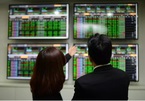 |
| Illustrative photo |
Capital increase plan
The Saigon Securities Company (SSI) increased its capital to VND9,848 bn in September, through issuance of nearly 218.3 million shares. When these additional shares were put into trading, SSI immediately announced the next capital increase plan. Specifically speaking, SSI will offer upto 497.3 million shares to existing shareholders at a ratio of 2:1, at offering price of VND15,000 per share, equivalent to mobilized value of VND7,460 bn. If successful, SSI charter capital will increase to approximately VND15,000 bn. At this time, the capital amount in SSI will be equivalent to that in a mid-range bank, such as TPB with VND11,700 bn; OCB with VND13,690 bn; HDB with VND19,922 bn; EIB with VND12,355 bn; SSB with VND14,780 bn; and VIB with VND15,530 bn.
VNDirect Securities (VND) has also just announced a similar plan to raise capital for the second time with an even larger number of shares than SSI. Accordingly, VND will offer 435 million new shares to existing shareholders at asking price of VND10,000 per share at ratio of 1:1. Simultaneously, VND also issued nearly 348 million bonus shares to existing shareholders at a rate of upto 80% and issued an additional 2% of capital under the Employee Stock Ownership Plan (ESOP) with an incentive of VND10,000 per share. These three options issued at the same time, if successful, will increase charter capital to nearly three times at VND, from around VND4,350 bn to VND12,265 bn.
Small securities companies are also in the race to raise capital this time. For example, APG Securities Company (APG) has just closed listing of more than 73 million shares at ratio of 1:1, at selling price of VND10,000 per share, to double its charter capital from existing VND1,462 bn. Recently, Viet Nam Industrial & Commercial Securities Corporation (VIG), announced to hold an Extraordinary General Meeting of Shareholders in 2021 with the most notable content being the plan to issue 66 million shares to increase the charter capital from VND341 bn to VND1,001 bn. Similarly, Asia-Pacific Securities Joint Stock Company (APS), announced an Extraordinary General Meeting of Shareholders with plan to issue 83 million shares at ratio of 1:1, to increase capital from VND830 bn to VND2,075 bn.
Huge gamble
With this new issue of shares, APS will offer to sell at VND15,000 per share. If successful, it will help APS earn VND1,245 bn. This amount focused by APS will supplement VND700 bn of margin lending and VND500 bn for proprietary trading. Similarly, with proceeds from the latest issuance, APG intends to allocate VND250 bn for margin activities and VND150 bn for proprietary trading.
The fact that securities companies are increasing capital to put money into these two operations is completely understandable because these are activities that bring huge profits for securities companies, and are not brokerage profits. The brokerage market share in the third quarter on HoSE at top three positions belongs to VPBank Securities Company (VPS) with 16.5% market share, but profit being far behind VND and SSI. Third-quarter business results of SSI with revenue and pre-tax profit reached VND1,846 bn and VND831 bn, respectively. In the first nine months of the year, SSI recorded total revenue of VND5,091 bn, and profit before tax at VND2,063 bn, up 53% and 92%, respectively.
Risk to investors
Issuing shares to increase the capital of securities companies at the present time is much more favorable than before because in the context of scores and liquidity continuously setting new records. This is reflected in the sharp price increase after the capital raising information was announced. For example, SSI had a price increase from VND45,000 per share to more than VND55,000 per share; VND increased from VND75,000 per share to more than VND80,000 per share; VIG increased from VND15,500 per share to VND19,000 per share; and APS increased from VND50,000 per share to VND60,000 per share.
Therefore, this wave of stock issuance brings profits to shareholders holding shares of securities companies. On the other hand, investors who are trading with these securities companies, especially those who do not use leverage, do not benefit from these capital increases. VPS is currently the leading securities company in terms of brokerage market share on HoSE, but as reflected by many investors who are trading on this securities companies, the trading system of these securities companies always encounters problems whenever the market fluctuates strongly. The failure of the trading system in these critical times causes investors to suffer heavy losses. Many people even question that these securities company intentionally cause an incident so as to give priority to the order of its own trading division before the order of the investors.
According to a securities expert, in the context of a hot market, increasing charter capital is also a way to help many securities companies have more money to pour into margin lending and self-trading activities with the expectation of increasing profits. However, the fact that securities companies heavily pumped money into margin lending and proprietary trading activities, not only put securities companies under pressure to increase their respective profits but also inadvertently push the market into a red zone.
According to statistics, the supply of margin has also become tense since the end of the third quarter, when the total outstanding loans of securities companies exceeded the milestone of VND154,000 bn. In terms of loans to equity of the top 30 securities companies with the highest equity, this ratio has increased to 1.2 times, while the number at the end of 2019 was 0.71 times and in 2020 it was 0. 94 times.
The fact remains that margin only poses a risk to investors, but once the market plunges because of hot margin cash flow, the securities companies themselves will be in danger in proprietary trading. Actually, proprietary trading activities pushed many securities companies at the brink of bankruptcy when the market fell during the recession in 2008 to 2009 period.
Source: Sai Gon Giai Phong

Worrisome concerns about stock market bubble
At the National Assembly last week, there were worrisome arguments about the structure of the budget revenue based on the stock market bubble and the real estate sector.

VN stock market hits record, big names rise
The Vietnamese stock market in the first half (H1) of 2021 broke many records.